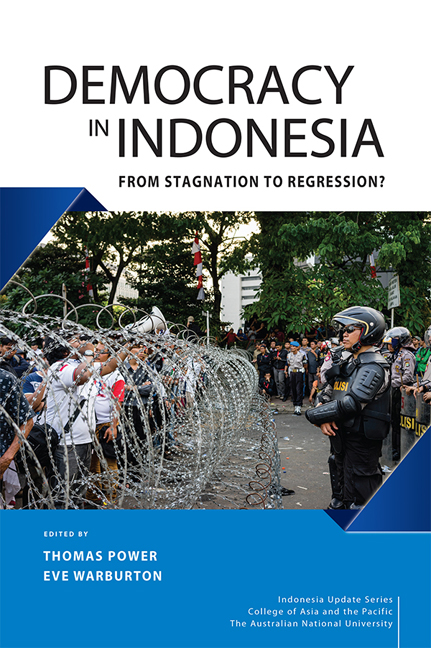Book contents
- Frontmatter
- Contents
- Tables and Figures
- Contributors
- Foreword
- Acknowledgments
- Glossary
- 1 The decline of Indonesian Democracy
- Part 1 Historic al and Comparative Perspectives
- Part 2 Polarisation and Populism
- Part 3 Popular Supp ort for Democracy
- Part 4 Democratic Institutions
- Part 5 Law, Security and Disorder
- Index
- Indonesia Update Series
14 - Assailing accountability: law enforcement politicisation, partisan coercion and executive aggrandisement under the Jokowi administration
Published online by Cambridge University Press: 24 November 2020
- Frontmatter
- Contents
- Tables and Figures
- Contributors
- Foreword
- Acknowledgments
- Glossary
- 1 The decline of Indonesian Democracy
- Part 1 Historic al and Comparative Perspectives
- Part 2 Polarisation and Populism
- Part 3 Popular Supp ort for Democracy
- Part 4 Democratic Institutions
- Part 5 Law, Security and Disorder
- Index
- Indonesia Update Series
Summary
Executive aggrandisement is among the most common modes of democratic backsliding in the post–Cold War era. The term refers to processes whereby elected governments weaken democracy from within by eroding institutional checks on the exercise of executive power (Bermeo 2016; Khaitan 2019). It entails the winding back of institutional accountability mechanisms, whether by hamstringing or dismantling independent state agencies, restricting criticism of the government, curtailing opposition activity within formal representative institutions, or otherwise undermining existing constraints on executive behaviour. Studies of executive aggrandisement tend to emphasise the horizontal expansion of executive authority, but the process is commonly accompanied by efforts to curb vertical accountability mechanisms, for instance by manipulating electoral processes or restricting popular protest (e.g. Sözen 2019).
Similarly, while formal institutional changes—particularly legal revisions introduced by elected officials—often provide the most visible evidence of executive aggrandisement (see Bermeo 2016: 10–11), incumbent executives may also concentrate political power by less overt means. In particular, the maintenance of democratic norms is especially important where laws are pliant or inconsistently enforced, or where the state's coercive apparatus is especially amenable to the direction of executive officeholders. In this vein, Levitsky and Ziblatt (2018) identify the principles of forbearance (that is, that governments should refrain from the punitive deployment of the law) and toleration (of political opposition and popular criticism) as essential to the maintenance of functioning democratic government. Thus, while legislative and constitutional revisions may often be the most visible embodiments of executive aggrandisement, the exploitation of longstanding democratic shortcomings—particularly those relating to the rule of law—is often essential in laying the groundwork for these more explicit changes.
In this chapter, I argue that at the heart of Indonesia's contemporary democratic decline is an assertive effort by the incumbent national executive to accrue and wield power in fundamentally anti-democratic ways. The presidency of Joko Widodo (Jokowi) has seen the increasingly coercive and punitive deployment of law enforcement agencies to silence government critics and restrict opposition activity, while also assailing reserves of independent legal and political authority that may otherwise serve to check the administration's powermongering.
- Type
- Chapter
- Information
- Democracy in IndonesiaFrom Stagnation to Regression?, pp. 277 - 302Publisher: ISEAS–Yusof Ishak InstitutePrint publication year: 2020

